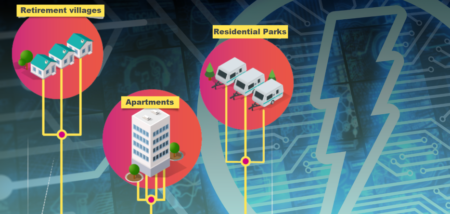Review of embedded networks
THE Independent Pricing and Regulatory Tribunal (IPART) has been asked by the NSW Government to make recommendations on new rules around maximum prices for customers in embedded networks. This plan was announced in February 2023 and public consultation began this week.
If this is something that you care about, now is your chance to have your say.
What is an Embedded Network?
An embedded network is a site where utilities like gas, electricity or water are supplied by a reseller instead of being sold directly by mainstream providers (such as AGL or Energy Australia).
This arrangement is common in residential land lease communities, as well as in some retirement villages, newer apartment complexes and shopping centres. It’s estimated that around 1 in 10 people in Australia are in embedded networks, as are many small businesses.
Third-party resellers that supply utilities to embedded networks are called ‘exempt sellers’. They are subject to different rules than mainstream providers, and there are currently not many limits on how much an exempt seller can charge for utilities. As a result, many users are charged far more than is reasonable.
It can also be difficult, even impossible, for embedded network customers to shop around for a different provider. Rebates and hardship assistance programs are also inaccessible.
Elsewhere in Australia, Victoria has banned new embedded networks for power in residential apartments unless strict requirements are met to ensure that these systems are beneficial to residents.
What is the Review About?
IPART has been asked to respond to a range of specific questions, as well as to provide any other information that they find relevant to the review.
Electricity:
- Should the default market offer that is set by the Australian Energy Regulator continue to be the benchmark for the maximum price of electricity in embedded networks?
As embedded networks are difficult to leave, the market is not competitive. Whilst exempt sellers must allow customers to change energy providers if they want, it is often more trouble than it’s worth, so there’s no push for providers to offer less than the maximum rate. IPART has been asked to recommend whether there is a way to determine the maximum rate for electricity in embedded networks that is fairer to consumers.
Gas:
- How should maximum prices be set?
Embedded gas networks are not covered by most of the legislation that applies to mainstream gas providers, and there are far fewer protections in place for consumers. Users may be unable to shop around for a better offer, meaning that gas can be expensive in these systems. IPART are looking at how to ensure that the cost of gas in embedded networks is appropriate.
Hot and cold water:
- How should maximum prices be set?
- Should new embedded networks for hot and cold water be banned?
Private parties who sell hot and cold water to embedded network users do not need to be licensed, and there is no requirement for water meters to meet a basic standard. Consumer protections are extremely limited. Most complaints from embedded network users are related to water bills, which vary hugely and can be extraordinarily expensive compared to the average market rate. Embedded network users paying for water may not have access to the Ombudsman for dispute resolution and water can be disconnected if there are billing disputes.
IPART is also going to make suggestions about how to make sure these proposed rules are being followed and what should be done if they are not. In making suggestions, IPART has to consider a number of factors. These include current legislation, differences between types of embedded networks, as well as short- and long-term impacts on all parties.
Why has IPART been asked to review this?
This review is a part of a NSW action plan to make new regulations related to embedded networks, such as ensuring that prospective tenants and homebuyers are fully informed. Other planned reforms include making sure embedded network users have equal access to rebates and other financial support schemes, as well as ensuring that consumers are not locked into long-term contracts.
There has been a lot of discussion around embedded networks, and we all know that the current system is unfair. It’s time to do something about it, and this is one way to get involved.
How can you have your say?
As a part of the review, IPART is undertaking a survey of customers in embedded networks.
This survey is asking for responses detailing specific issues and benefits related to being a part of an embedded network. They also want to know if you have ever tried to ‘leave’ an embedded network by finding an alternative provider, what your views are on pricing limits, and several other relevant questions.
Please note that the IPART survey also asks for copies of utility bills – however, if you wish to, you can skip any question that you do not wish to answer whilst still providing a valuable perspective.
CPSA plans to make a submission to the IPART review. If you have a perspective or story that you feel CPSA should take into consideration, please get in touch.
IPART will open submissions to their draft report in November, and their final recommendations are due in March 2024.
Related Articles
- Energy bill relief in embedded networks
- How much is your power bill going down?
- Energy bill cuts for embedded network customers
- Are you embedded electricity wise?
CPSA is also preparing feedback to pass on to IPART, you can contact us with your experiences by email at cpsa@cpsa.org.au or by calling (02) 8836 2100 to speak to a member of our team. Update (14/9/23): Please find CPSA’s submission here.
Become a member of CPSA today for only $15.
